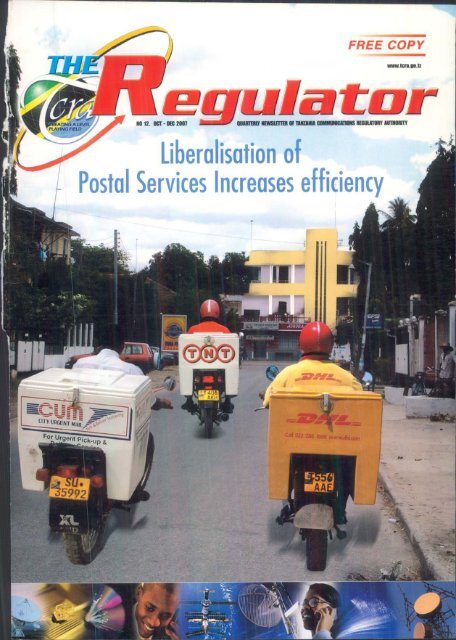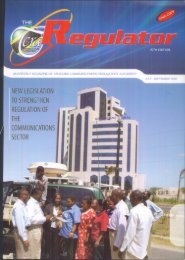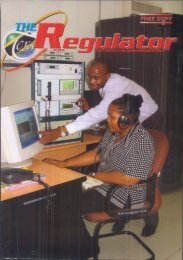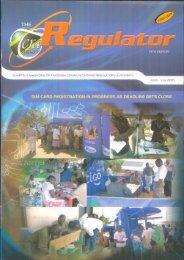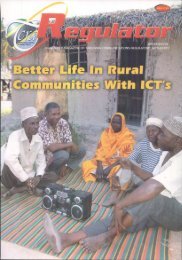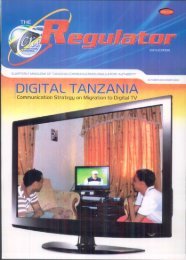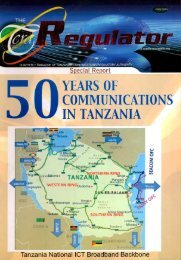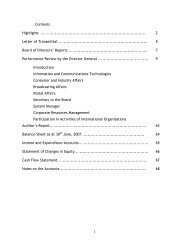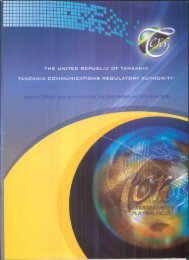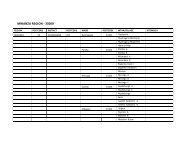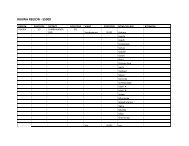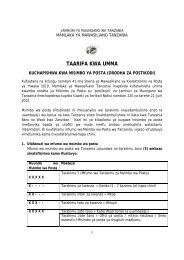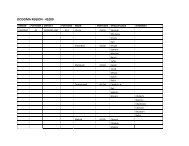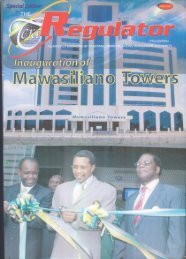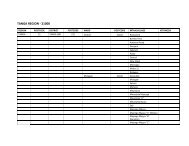12th Edition - Tanzania Communications Regulatory Authority
12th Edition - Tanzania Communications Regulatory Authority
12th Edition - Tanzania Communications Regulatory Authority
Create successful ePaper yourself
Turn your PDF publications into a flip-book with our unique Google optimized e-Paper software.
ir<br />
c<br />
'<br />
FREE COPY<br />
www.tcraJo.tz<br />
ejiJiitur :<br />
EATJNGA LEVEL NO 12. OCT - DEC 2001 QUARTERLY NEWSLEITER OF TANZANIA COMMUNICAUONS REGULATORY AUTHORITY<br />
PLAYING FIELD<br />
Liberalisation ot<br />
4<br />
'<br />
%_ --V--<br />
RI - ,<br />
'V<br />
Postal Services Increases efficienq<br />
I.<br />
Li :<br />
-<br />
, " II<br />
- IIT<br />
- II<br />
,-<br />
# j<br />
, ,<br />
... !1 ''<br />
AVR<br />
M*M:' ; , -<br />
.; 4!O ,<br />
, 1!r.r<br />
r<br />
FOrUrqç?fl<br />
.,<br />
Pickuf)<br />
I: I'<br />
:<br />
S •<br />
:<br />
.Aj
Published quarterly by the Linzmn ii (om mu ii ications<br />
<strong>Regulatory</strong> <strong>Authority</strong> (TCRA), an independent<br />
government agency established under the <strong>Tanzania</strong><br />
<strong>Communications</strong> <strong>Regulatory</strong> <strong>Authority</strong> Act No.12 of<br />
2003 to regulate communications and broadcasting<br />
sectors in <strong>Tanzania</strong>. TCRA became operational on<br />
1 I 11 /2003 and has effectively taken over the functions<br />
of the <strong>Tanzania</strong> <strong>Communications</strong> Commission and the<br />
<strong>Tanzania</strong> Broadcasting Commission<br />
Failzdniì Coiiiunications <strong>Regulatory</strong> <strong>Authority</strong> (FCRA) ciopteci<br />
a new corporate logo in 2005 following the merger of <strong>Tanzania</strong><br />
Communication Commission(TCC) and <strong>Tanzania</strong> Broadcasting<br />
Commission(TBC) in 2003. The logo reflects glohalisation, national<br />
flag and corporate motto.<br />
The <strong>Authority</strong>'s offices:<br />
Head office: Mawasiliano House<br />
Plot 304 Ali Hassan Mwinyi /Nkomo Road<br />
P.O Box 474 Dar Es Salaam<br />
Tel: 255 22 2118947/52; 0784 - 558270<br />
Telegram: TUMEWASILI<br />
Fax: 2116664<br />
E-mail: dg@tcra.go.tz<br />
Website: www.tcra.go.tz<br />
Frequency Management Centre<br />
Plot 771 /3, Kambarage Road<br />
Mikocheni B, Dar es Salaam<br />
Tel: +255 22 2773002/4/8<br />
Fax: +255 22 2773006<br />
Zanzibar: Plot No. S/CHR 95, Chukwani area,<br />
p. 0. Box 3284, Zanzibar<br />
Tel/Fax: 255 24 2235062<br />
E-mail: zanzibar@tcra.go.tz<br />
ZONAL OFFICES:<br />
TCRA Northern Zone Office<br />
Third floor, Summit Centre,<br />
Sokoine Road,<br />
Box 15675, ARUSHA<br />
Tel: +255 27 2548947<br />
[-nidil: irtili(('tcri.go.tz<br />
TCRA Lake Zone Office<br />
Stanbic Building, Nyerere Road<br />
lO Box 3108, MWANZA<br />
Telephone/Fax: +255 28 2541082<br />
Email: mwanza(i)tcra.go.tz<br />
TCRA Southern Highlands zone Office<br />
Karume Avenue NSSF Building.<br />
Box 1375, MBEYA<br />
Tel. No. +255 25 250294<br />
Fax No. +255 25 250294<br />
E-mail: mheya)tcra.go.tz<br />
TCRA Central Zone Office<br />
Kisasa Area, DSM Road;<br />
Near Mwangaza Radio Station.<br />
7B Natron Avenue NSSF Building.<br />
Box 2229, Dodoma<br />
Tel. No. +255 26 235 0021<br />
Cell No. +255 754 787 222<br />
E-mail: dodoma(tcra.go.tz<br />
Logo Concept<br />
. Globe- Impact ol Glohalisation on thc L1flctio11 ol thu 1( l
Contents<br />
$F ' ,.I<br />
4 TANZANIA POSTAL, COURIER SERVICE PROVIDERS<br />
INCREASE SIGNIFICANTLY<br />
;<br />
/<br />
6 TCRA PROMOTES REGULATION BY (ONSULTA1;<br />
1 U.)HL IL VVUM) i-U'W i U)II-L IL UIáVi) I<br />
TANZANIA - AFTER TEN YEARS, HAS THE<br />
GOVERNMENTS OBJECTIVES BEEN ACHIEVED?<br />
CONSUMERS RICHS IN PEFSIE( lIVE<br />
.<br />
1 5 MANAGING FREQUENCY SPECTRUM FOR ECONOMIC<br />
& SOCIAL DEVELOPMENT<br />
BEPROUDTOBE.TZ<br />
ș1<br />
ri r<br />
LL NEW MOBILE RADIO AND FREQUENLI<br />
MONITORING STATIONS DISPATCHED TO LONE<br />
:!" NEWS FROM OTHER REGULATORS<br />
ii-<br />
RIGHTS & OBLIGATIONS OF CONSUMERS OF<br />
COMMUNICATION SERVICES
$flM T DGs DESK<br />
Postal Sector and Development of<br />
Information and <strong>Communications</strong><br />
Technologies<br />
TUE POSTAL SECTOR plays a key role in connecting<br />
people through physical postal network. Postal<br />
Services are an important part of the information<br />
society as they help not only to provide links to the<br />
less densely populated areas but their networks and<br />
logistics can be utilized for the introduction of new<br />
Information and corn munications Technologies<br />
(ICTs) services. While information and<br />
communications technologies can substitute certain<br />
types of mails, overall the two types of<br />
commun ications media are cornplernentary.<br />
The World Summit on the information Society in<br />
Tunis in 2005 recognizes the postal sector for its role<br />
in connecting people and in promoting international<br />
trade particularly through e-commerce. There is also<br />
a direct relationship between economic development<br />
and postal service. This can be demonstrated by<br />
comparing GDP and letters per capita per year in sub<br />
Saharan Africa. Likewise postal services in <strong>Tanzania</strong><br />
have been a vehicle for transmission and exchange of<br />
written documents and parcels throughout history<br />
bringing together innovative ideas among its people<br />
and linking them to other nations of the world<br />
The postal sector therefore has to realize the<br />
importance of the development of information<br />
technology and take challenges as opportunities by<br />
developing electronic network to support and<br />
moderni7e the physical delivery network.<br />
This includes implementing reforms that embrace<br />
ICTs among the new services it offers to customers,<br />
while at the same time using ICTs to improve the<br />
quality of service of the core business. UPU is<br />
considering to include an c-Post strategy in the<br />
Nairobi World Postal Strategy during the 24th<br />
Congress in 2008 to enable countries provide the next<br />
generation of postal electronic services together with<br />
improving the quality of service of its core business.<br />
This is an important objective which recognizes that<br />
the future of the postal services will depend largely<br />
on its ability to adopt physical networks to the<br />
electronic postal services. ICTs have been recognized<br />
worldwide as an important part of postal services<br />
that have many possible applications which are used<br />
today to meet customer demands. These include<br />
advanced mail sorting technologies, electronic track<br />
ing and tracing of courier items, automation of<br />
counter delivery services, electronic reproduction of<br />
mail (Hybrid mail) and electronic money transfer<br />
system through data exchange.<br />
The <strong>Authority</strong> has licensed a number of postal<br />
operators, who have greatly contributed in bringing<br />
about availability of postal services closer and<br />
efficient postal delivery to the public. Licensing has<br />
promoted competition in the sector. Competition in<br />
the postal sector has the potential to grow the same<br />
way as telecommunication sector has seen rapid<br />
growth. The increased number of postal and courier<br />
Services operators licensed has shot up from 13 in<br />
2003 to 48 as of September this year (2007) which<br />
shows that demand for postal services is also<br />
growing.<br />
It is therefore important for the operators to improve<br />
their services to meet customers changing demand<br />
and develop strong networks that allow adoption of<br />
IT based services. Currently the postal sector in<br />
<strong>Tanzania</strong> has diversified its services offering a wide<br />
range of services including internet services to the<br />
branch offices. Plans need to be put in place parallel<br />
with the development of broad band network of the<br />
telecommunications sector to extend the electronic<br />
postal services to low populated areas among other<br />
things information centers and electronic money<br />
transfer system. TCRA encourages reforms in the<br />
postal sector that include ICTs in the provision of<br />
services with the aim of developing a three<br />
dimensional network that provides phvica1,<br />
electronic and financial services.<br />
Prof. John S. Nkoma<br />
DIRECTOR GENERAl.<br />
TCRA
TANZANIA POSTAL, COURIER SERVICE PROVIDERS INCREASE SIGNIFICANTLY<br />
BY SEMU MWAKYANJALA<br />
( ul/1Jl11' j;ij (()1/!/)1iI('l1lI1 !IIh'lJl(lIR)IlllI /?ii(('I 11 (I /11(1/I, I(t 1 ti/lye<br />
JE-IFRE has been significant increase in the number<br />
of postal and courier services operators in the<br />
country, over the last six years from 13 in year 2000<br />
10 1 1( t(Il )f 4 i (1 c;tember this year (2007).<br />
I J<br />
The operators, who are licensed<br />
by the <strong>Tanzania</strong><br />
<strong>Communications</strong> <strong>Regulatory</strong><br />
<strong>Authority</strong> (TCRA)<br />
feature in six main categories in<br />
their operations in the sector.<br />
The categories are Public Postal<br />
Operator, International Courier<br />
Operators, East African Courier<br />
Operators, Domestic Courier<br />
Operators, Intracity (within one<br />
city) and Intercity Courier<br />
Operators.<br />
All the operators howevei;<br />
interact freely and compliment<br />
each others services through<br />
special agreements, which<br />
benefit even more the clients in<br />
the sector. Despite increase in the<br />
total number of postal and<br />
courier service providers the<br />
sector is yet to be fully utilised<br />
hence remains one of the<br />
best investment zones in the<br />
country.<br />
<strong>Tanzania</strong> Posts Corporation<br />
(TPC) prominently stands as the<br />
I F only Public Postal Operator in<br />
r r the Country, providing both<br />
Basic postal services and<br />
J<br />
Expedited Mail Services (EMS)<br />
( Domestic and International),<br />
electronic money transfers and<br />
ICT related services like Internet<br />
services. TPC has a network of over 400 service<br />
outlets, with 3,200 authorised stamps vendors and<br />
installed a total of 172,344 private letter boxes<br />
countrywide.<br />
IostaI and courier services play key role ot<br />
enabling transmission of innovative ideas among<br />
people and increase economic growth by bringing<br />
people and business together through exchange<br />
of written documents, monetary transactions and<br />
physical items including parcels.<br />
1CRA has licensed five International courier<br />
operators. The International courier operators are<br />
DHL International (T) Ltd, Diamond Express (T)<br />
Ltd. Skynet (T) Worldwide Express, Sangare<br />
Enterprises Ud and the <strong>Tanzania</strong> Express Cargo<br />
Ltd.<br />
Rauawrj
------ -<br />
Stanip services, a popular cost effective means offootirig costs for sending and receivin , iiiiiI.<br />
The third category is the -East African Courier<br />
Operators. They include Akamba Bus Service<br />
Limited, Scandinavian Express Services Limited,<br />
One World Courier (T) Ltd.<br />
Seven other operators are licensed under the<br />
category of Domestic operators. Thiee re<br />
Ndengaro Agencies and Consultants, City<br />
Delivery Services (CDS), Global Skychain Express<br />
Co. Ltd,<br />
Mohamed Trans Ltd, National Courier, City<br />
Messengers Ltd, CMTL Courier Services Ltd and<br />
<strong>Tanzania</strong> Standard (Newspapers) Ltd.<br />
The fifth category is intracity couriers, implying<br />
that they are responsible for handling courier<br />
items within the city of Dar es Salaani. There re<br />
only two operators in this category. These i<br />
Express Courier Services Ltd and Tanzacom<br />
Messenger Services Limited.<br />
The majority 31 operators under the Sixth category<br />
of Intercity, which entail ferrying of items<br />
between two cities. They include Faster Flight<br />
Express, Raha Leo Bus & Transporters, Riversie<br />
Car Hire & Shuttle, Secularms (T) Ltd, Zaoma Ltd,<br />
Tricon Investment, Malai Freight Forwarders<br />
Limited, John Terry Establishments Ltd, Lyoto &<br />
Company Ltd, Mhasibu Consultants, City<br />
Courier Co. Ltd. Impala Shuttle, Raha leo Bus dud<br />
Transporter, Pronto Con riers a nd U ii i ted Tdlent<br />
Services.<br />
Other Intercity couriers are Fosters Auctioneers<br />
and Debt Collector, P.T. Burrow Ltd, Sengeremi<br />
Engineering Group, RAM Investment, Northern<br />
Engineering Works Ltd, Hima Investments Ltd,<br />
Building Centre Establishment Bureau Ltd,<br />
Community Electrical & General Supplies Ltd,<br />
Chap Deliveries, Mechanised Cargo System ('F)<br />
Ltd, Hekima Enterprises Co. Ltd, Dar Express<br />
Bus Services, Alpha Quality Services and Hammv<br />
Distt'ibUtOIs &z: Services Ltd<br />
All the operators pertorm their duties<br />
symbiotically. If the items are destined for extreme<br />
rural parts of the country, where intercity operators<br />
don't have a links, the items are instantly handed<br />
over to another operator with a wider link like the<br />
TPC, which is capable of reaching specific distant<br />
Locations.
:<br />
TCRA PROMOTES REGULATION BY CONSULTATION<br />
-. -- -_ -- - -----<br />
I/iL' Paiit'l, ioiiiprised of the TCRA Board Chairman Ainbassadoi Ric/iai1 \4auiki (thud riIit) iiid 1 CRA Director Ge,icial Prof [a/ui t'.Jkoiiia<br />
(lou ,t1 ui((1i I ) i,i 11(11' (1I)J)IiC(1!I ti 7L'itl! (111(1 Ru ho S tii tioiis.<br />
he merger of <strong>Tanzania</strong> <strong>Communications</strong><br />
Commission (TCC) and <strong>Tanzania</strong> Broadcasting<br />
TCommission (TBC) in 2003 to form the<br />
<strong>Tanzania</strong> <strong>Communications</strong> <strong>Regulatory</strong> <strong>Authority</strong><br />
(TCRA) as an independent regulator under the TCRA<br />
Act No. 12 of 2003 brought new ways of performance<br />
of the communications regulations.<br />
'Ihe merger was an important instrument in<br />
encouraging competition in the communications<br />
sector following the liberalization of broadcasting<br />
iil t(l(('Ofl1fl1UfliC1ti()11' (CtO1- in 1 993 in Taiiiini i.<br />
Iii 2005, <strong>Authority</strong> embarked on strategic reforms to<br />
reshape its licensing framework to accommodate new<br />
developments in technology that has blurred the<br />
d istinction between telecommunications and<br />
broadcasting. The <strong>Authority</strong> has been always<br />
promoting competition by encouraging and licensing<br />
fliOlO investors subject to the availability of frequency<br />
11.<br />
he iiitiod LIChOfl of the Converged Licci islig<br />
Framework (CLF) on 23rd February 2005 that<br />
I n.troduced four basic tier system of licences Network<br />
Facilities (NF), Network Service (NS), Application<br />
Services (AS) and Content Service (CS) not only<br />
paved a way for investors to apply for Content<br />
I_uIata1;<br />
Services Licences (CSL) but also promoted and<br />
enhanced the principles of transparenc y in the<br />
licensing process in the country.<br />
The <strong>Authority</strong> under the CLF has been upholding the<br />
process of consultation with stakeholders at different<br />
levels culminated into one to one meetings to thrash<br />
out final points on the licences. The real objective of<br />
the consultations with stakeholders is to implement<br />
one of the <strong>Authority</strong> corporate values of regulating<br />
by consultation.<br />
The <strong>Authority</strong> recognises that the process of<br />
consultation with stakeholders as a key instrumental<br />
tool of any independent institution. The <strong>Authority</strong><br />
believes that without consultations and transparency<br />
a stable and predictable communicatjons investment<br />
climate will remain elusive in <strong>Tanzania</strong>.<br />
It is also important to note that the increase of<br />
numbers of new entrants in the communications<br />
industry has been also influenced by the <strong>Authority</strong><br />
principles of transparency and fair competition.<br />
These two principles have made the <strong>Authority</strong> to<br />
attract more investors in the broadcasting industry.<br />
The <strong>Authority</strong> is also highly recognized worldwide<br />
for its excellence in regulating communications<br />
providers and operators.<br />
In carrying out of its functions the <strong>Authority</strong> is
equired under the Act to enhance the welfare of the<br />
<strong>Tanzania</strong> society by promoting effective competition<br />
and economic efficiency. It is expected that with fair<br />
competition, content (broadcasting) service providers<br />
will effectively compete among themselves and also<br />
provide quality content services to their consumers.<br />
This is one way of implementing the MDGs in the<br />
pursuit of universal service! access.<br />
In <strong>Tanzania</strong> where competition in communications<br />
industry is encouraged and promoted the <strong>Authority</strong><br />
must promote and protect the principles of<br />
transparency. The <strong>Authority</strong> has to make sure that:<br />
0 Rules must allow for criteria for licences<br />
allocation be applied in an objective and nondiscriminatory<br />
manner, particularly where<br />
the scarce resources (such as radio spectrum)<br />
are involved.<br />
0 Criteria which prospective operators have to<br />
meet and terms or conditions applicable to<br />
licences should be either published or<br />
publicly available.<br />
0 Models licences or conditions for operation<br />
under registration, where appropriate)<br />
should also be publicly available.<br />
0 The licensing process should facilitate<br />
liberali za tiO1, he technology and service<br />
neutra I.<br />
0 Licence duration should be reasonable,<br />
renewal process clear and fees attached to all<br />
licences should reflect the administrative cost<br />
of issuing licence.<br />
News in Brief<br />
More Competition in the Broadcasting Sector<br />
The <strong>Authority</strong> on 13th July 2007 invited 17 applicants<br />
for content service licences to attend an interview in<br />
Dar es Salaam. A total of 8 applicants for content<br />
service licences and 2 for support services for satellite<br />
subscription broadcasting services were approved for<br />
a grant for content services licences. However, three<br />
applicants were required to resubmit their documents<br />
while three applications were not sustainable projects<br />
and they have to apply afresh in future.<br />
The applicants were given an opportunity to defend<br />
their broadcasting project proposals. This also helps<br />
to know the seriousness of the investors in relations<br />
to sustainability of the projects in future and financial<br />
capability of the investors.<br />
The <strong>Authority</strong> has been receiving a number of new<br />
applications while prospective investors have been<br />
encouraged to venture into the broadcasting sector by<br />
guaranteeing and promoting fair competition among<br />
the content services providers to ensure that latest<br />
technologies are offered thus guaranteeing improved<br />
service delivery and reduction of costs.<br />
/\/)J)/1( iii1 fr a pail 1', (TTV SIafioii iiitcrvictt'd.
U<br />
:i±iiiii I<br />
INNOVATION<br />
TECHNOLOGY<br />
VISION<br />
These have always been the key<br />
points of our operating philosophy.<br />
, INNOVATION .<br />
yr<br />
This pioneering station was launchea ••<br />
in 1994 with a program mix that has<br />
remained unsurpassed. It has the<br />
latest and best dramas, comedies,<br />
sportsand movies as well asthe most<br />
VA<br />
LI<br />
uptodate news and information.<br />
In ten years 1W has managed to<br />
distinguish itself as the leading<br />
broadcasting station in the country<br />
by sustaining quality and being the<br />
most reliable source of information.<br />
TECHNOLOGY<br />
TV has always maintained technology<br />
as being of paramount<br />
importance in television. This has<br />
enabled the most efficient expression<br />
of the creativity of our staff as well as<br />
ensuring that we enjoy the widest<br />
coverage and greatest reach in the<br />
country using our satellite uplink<br />
facility.<br />
I<br />
;.____<br />
.?r) • *. RADIO ONE<br />
VISION<br />
liv has bold and ambitious plans for<br />
the future. We fully intend to<br />
consolidate our established position<br />
as a major force in the region, and in<br />
conjunction with other broadcasters<br />
we plan to become a major player on<br />
the continent.<br />
,, !: J L f v Radio one is one of the pioneer FM<br />
h?L!r<br />
" (%. stations in the country The station<br />
:s<br />
I -<br />
arted its operations in 1994 It<br />
V ç;:;: : ' r *. dcasts via digital satellite link<br />
'; '42 \ t itssignaI is received in the whole<br />
station's airtime is dedicated to music.<br />
Researches indicate that Radio One<br />
listnership is particularly stron9 in<br />
Dar-es-Salaam, Arusha, Moshi and<br />
Dodoma.
Postal Networks and Postal Reforms in <strong>Tanzania</strong> - After ten years,<br />
has the Government's objectives been achieved?<br />
By Haruni H. B. Lemanya<br />
TCRA Board Chairman Ambassador Richard Marki presents a souvenir of Makonde<br />
carvings framed in glass to the Universal Postal Union (UPU) Director General<br />
Edouard Dayan at the UPU 1-Ieadquarters-Berne Switzerland in March 2007.<br />
POSTAL SERVICES<br />
Postal service is an established system of collection,<br />
dispatching, transporting, handling and delivery of<br />
postal articles through a postal entity. It is part of<br />
delivery services, which mainly transmit<br />
information in written or printed from. It is also part<br />
of info- communication system as it carries<br />
information in form of letters, documents,<br />
newspapers and periodicals, advertisements,<br />
financial instruments (cheques, promissory notes),<br />
printed matters to mention just a few.<br />
Furthermore, the postal service is an<br />
infrastructure services in the same way<br />
as telecommunications, piped gas and<br />
electricity, water supply, sanitation and<br />
ewerage etc. It has distribution<br />
ietwork; accessible to all citizens and<br />
hrms; has standardised services and<br />
t'esponsihle for a universal service.<br />
Main economic functions of postal<br />
infrastructure are that it provides<br />
ssential two - way communication<br />
inks which bring buyers and seller<br />
together, forge markets, build<br />
relationships, turn itself to distribution<br />
channel and facilitate payments and<br />
satisfy demand of suppliers and<br />
buyers.<br />
WHY PUBLIC OWNERSHIP<br />
POSTAL SERVICES<br />
Until recently the postal industry<br />
throughout the world has been<br />
characterised by a substantial degree of<br />
statutory monopoly power and stateowned.<br />
The original justification for<br />
widespread public ownership in the<br />
1970s and 1980s was extensive market<br />
failure, both at micro and macro level.<br />
Market failure is caused by<br />
ex te rn al i ties and information poverty<br />
as a result of poor infrastructure and<br />
low income, which is unequally<br />
distributed, and the difficult faced by<br />
the government to achieve its<br />
objectives through u so al ii a rket media n i sm s.<br />
In the last two decades, many governments<br />
including <strong>Tanzania</strong> have adopted economic reform<br />
programmes, which have liberalised their<br />
economies and international transactions have been<br />
freed.<br />
Clobalisation has been facilitating the economic<br />
reforms and functioning of the markets in general by<br />
providing capital, expertise, technology and other<br />
Rguiata
means, which reduce transaction costs, increase<br />
efficiency and provide the benefits of open market to<br />
an increasingly larger share of population. The social<br />
sectors like postal services have also been in the<br />
process of reform.<br />
The primary issues in any postal reform is to<br />
respond to the challenge of building a healthy and<br />
viable postal service whose core business is selfsustaining<br />
in a liberalized and increasingly<br />
globalised market. It can be argued that the postal<br />
services sector is in what could be termed as<br />
anomalous position of being liberalised and<br />
regulated simultaneously bringing tension between<br />
the need to define the scope and form of regulation<br />
on the other hand and the area for competition to<br />
deliver on the other hand.<br />
GOVERNMENT OBJECTIVES FOR POSTAL<br />
LIBERALISATION<br />
The government's objectives in liberalising the<br />
postal market in 1994 were:-<br />
0 Sustain the provision of universal quality<br />
postal service;<br />
0 Be a catalyst in making the national<br />
economy competitive regionally and<br />
globally; and<br />
0 Be an important component in making<br />
<strong>Tanzania</strong> an effective player in the global<br />
information society".<br />
The expected benefits were to accrue to the<br />
Government, Regulator, Postal operators and the<br />
society at large as follows:<br />
- protect interest of consumers<br />
who can benefit by efficiency of<br />
companies providing them with<br />
services;<br />
- further improved service<br />
performance and efficiency for<br />
<strong>Tanzania</strong> Posts Corporation,<br />
with increased competition<br />
providing a spur to achieving<br />
greater efficiency and<br />
responsiveness to consumers;<br />
- increased choice for<br />
consumers, and the entrance of<br />
providers to serve niche<br />
markets; and<br />
- attract private sector<br />
participation bringing faster<br />
growth of business or wider<br />
service I network coverage.<br />
ACHIEVEMENTS<br />
The government's locus,<br />
therefore, was in enhancing<br />
consumer choice and welfare,<br />
and in using liberalisation as a<br />
tool to achieve this by keeping<br />
competitive pressure on<br />
<strong>Tanzania</strong> Posts Corporation.<br />
iispc'cted itt';iis and parcels are scaiint'tI tt" eL11rit 1/ pii/ )C iii (ill \ - liii iliac/li lit' to eiiiiit'<br />
1(1I'(1(1L itCillS arc in fcrc('pt('(I.
-<br />
t<br />
ij<br />
L<br />
I<br />
Consumer choice<br />
There is little doubt that consumer choice has been<br />
enhanced by the liberalisation of the <strong>Tanzania</strong> postal<br />
market. Although <strong>Tanzania</strong>'s postal volumes are<br />
relatively small, over 40 operators have entered the<br />
market to compete with <strong>Tanzania</strong> Posts Corporation<br />
since 1994.<br />
The <strong>Tanzania</strong> <strong>Communications</strong> <strong>Regulatory</strong><br />
<strong>Authority</strong> has blocked some of these private for<br />
some reasons including non-compliance to<br />
conditions of licence. Furthermore over the period of<br />
the last ten years around one-third of new entrants<br />
have failed to be sustainable and the majority of<br />
these businesses failed within two years.<br />
The <strong>Tanzania</strong> regulatory scheme requires any<br />
operator be monopoly or operating outside the<br />
reserved area (operation in basic postal services) be<br />
licensed by the <strong>Tanzania</strong> <strong>Communications</strong><br />
<strong>Regulatory</strong> <strong>Authority</strong> (TCRA).<br />
The competitors which have emerged fall, broadly<br />
speaking, into five main categories. These are:<br />
0 city! town and niche-operators known as<br />
intracity couriers;<br />
0 inter-cities or inter - towns operators;<br />
0 national or semi-national networks domestic<br />
couriers;<br />
0 regional network covering the east Africa<br />
region known as East Africa Couriers; and<br />
0 international operators competing with<br />
<strong>Tanzania</strong> Posts Corporation in the domestic<br />
markets as well as international market.<br />
llic ivain fcL1ures of the competihon in the country<br />
comprise operation of individual networks of the<br />
couriers. Intracity and intercity couriers have been<br />
small niche players trying to offer locally - oriented<br />
service and in some areas they have been very<br />
successful and in some not. Success stories of<br />
courier operators are coming from Dar es Salaam,<br />
Arusha, Mbeya, Tanga, Mwanza and Iringa.<br />
The <strong>Tanzania</strong> Posts Corporation is required to<br />
provide its competitors with access to its network on<br />
terms and conditions which at a large extend not<br />
uncompetitive. The major entrants wishing to<br />
provide nationwide service in <strong>Tanzania</strong> can<br />
therefore be expected to interconnect with TPC's<br />
network. In view of the aforesaid, it is economically<br />
unviable for new entrants to duplicate a nationwide<br />
on the scale operated by the public operator.<br />
The existence of over 40 operators clearly indicates<br />
that consumer choice at all levels of the <strong>Tanzania</strong>n<br />
postal market has been increased by the introduction<br />
of competition. Business mailers have benefited<br />
from this choice - but so too have casual users of the<br />
mail service. A key point to note is that the benefit of<br />
choice has been offered not only to bulk mailers in<br />
the main cities: some successful small operatioii<br />
have begun in small towns and regional centres.<br />
Quality of postal services and customer<br />
responsiveness<br />
The threat of liberalisation the beginning of<br />
competition has served well in acting as a spur to<br />
encouraging <strong>Tanzania</strong> Posts Corporation to maintain<br />
and improve its quality of service, to fulfill its<br />
universal service obligations, and still operate<br />
profitably.<br />
A customer can be assured that mail posted to all<br />
major town in the country will be delivered within<br />
24 hours and other towns within 48 hours. <strong>Tanzania</strong><br />
Posts Corporation has achieved the world standard<br />
of domestic deliver y to the rtirl ii -vis within five<br />
days.<br />
The arrival of competition has seen the company<br />
diversify its services significantly - both within its<br />
core postal expertise and new ventures. Cultural<br />
change has helped the incumbent operator to<br />
become more customer-focused quickly responding<br />
to customer inquiries and complaints.<br />
Postal services charges<br />
There have been significant reductions in prices in<br />
both real and nominal terms for the courier services<br />
and where price increases of the basic services have<br />
taken place; they have been at longer intervals than<br />
under the old regime. Smaller operators especially<br />
those operating in limited networks have beezi<br />
offering their services at very competitive ritvs.<br />
CONCLUSION<br />
Ten years is a relatively short timeframe for one to<br />
judge a Government or regulatory regime, but i<br />
seems reasonable to say that the currciit<br />
arrangements have had a positive impact eu<br />
<strong>Tanzania</strong>. It is evident that postal markets and<br />
liberalisation in <strong>Tanzania</strong> has resulted in a loverin<br />
RNau1arDr9
I 'ffii',it (111(1 R/1/'l('I I('(Ili)/li( /11011(1/ !1(11!f('1 (1i((*<br />
of postal monopolies and increased competition for<br />
traditional j)()ti11 products.<br />
Postal cusoiners have enjoyed improved quality<br />
mail service at reasonable postage rates although in<br />
5OITl cases reduction of delivery network has<br />
produced undesirable results. Several alternative<br />
networks are also developing at both a national,<br />
regional and international level; and consumer<br />
choice has been enhanced.<br />
I ii the reform process however, there is a need to<br />
Cd rciully weigh the provision of universal service<br />
dgainst the commercial objectives of the post office.<br />
'the main aim of universal service is to safeguard the<br />
ability of the general public to communicate<br />
regularly at a reasonable cost.<br />
I I is thc vievpoint of I he dUthor that u ivet's<br />
service needs should be kept flexible and dynamic to<br />
take into account the rapid changing ways in which<br />
the citizens communicate.<br />
The achievement of the public policy choice highly<br />
depends on the long term of the government<br />
economic policy. The underpinning argument in the<br />
reform process is that privatisation of utilities like<br />
postal services should be construed as<br />
complementary and not supplementary to other<br />
approaches.<br />
While deregulation and gradual introduction of<br />
competition are important ingredients in this<br />
process, there are must be a balance of commercial<br />
objective of the post office, legal status (ownership)<br />
and regulation, defining clearly the universal service<br />
obligation required of incumbent operator.<br />
Rtiui.tti; ,
CONSUMERS PROTECTION IN PERSPECTIVE<br />
4<br />
.<br />
Ii<br />
/ 1<br />
7/1C CO)J1JJIOJUVL'(lIt/l ICIL'COl)llllllJliC(ltiL)JlS O1g(11l!S(ltlt)Jl (CIIC)) Chief ExeLlituc OJjicci (CE(J) L)r LIott' Sjno-(aibia/i (c'coiitI ii/it) oii a<br />
iiernorable photo with the new Consumer Consultative Council (CCC) members in Dar es Salaani in September 2007. On Dr Ekwou' '<br />
1i ( ht, are CCC Chairperson Ms Hawa Ng'humbi who is also District Conimissionerfor Mvomero District in Morogoro Region and<br />
Lngineer August Kowero ofthe Ministry ofinfrastructure Development. Right is CCC Executive Secretaril Dr Keuti Riitabingwa au!<br />
buick-iou 'u'iitic iS Mr Iuiuuc Mriuuuia Managing Editor of<strong>Tanzania</strong> Standard Newspapers (TSN) Limited<br />
Q & A: Consumer<br />
Complaints Procedure<br />
Question: What is the first thing unsatisfied consumer<br />
of communication services should do in order to get his<br />
problem solved?<br />
/\ imwer: Consumers should first of all, contact the<br />
company agency or service provider whose services or<br />
products they are not happy or satisfied with. In event<br />
that the service provider does not satisfactorily solve<br />
the problem, he can now proceed to file a written<br />
complaint with TCRA.<br />
Question: How can a subscriber/Consumers lodge a<br />
complaint?<br />
r: A complaint to TCRA must be in writing. The<br />
con p1(int must fill in Complaint Forms in triplicates,<br />
which must of necessity be readable, clear and to the<br />
points(s). Every complaint should be addressed to<br />
TCRA as follows:<br />
The Director General,<br />
<strong>Tanzania</strong> <strong>Communications</strong> <strong>Regulatory</strong> <strong>Authority</strong>,<br />
Mawasiliano House, Plot Number 304,<br />
Ali Hassan Road I Nkomo Street,<br />
P. 0. Box 474,<br />
Dar es Salaani,<br />
TANZANiA.<br />
Email-dg@tcra.go. &<br />
Q uestion: What particulars of the collipldint should be<br />
furnished along with the comp! u u<br />
Answer: The particulars in the complaint should<br />
include complainant contact address (including name,<br />
address, phone number, Fax, e-mail) and the problem<br />
he/she is facing and its duration. A brief explanation of<br />
the circumstances that led to the complaint, name of the<br />
service provider and their respective contact address.<br />
Please also attach evidence of previous<br />
communications with the respective service or goods<br />
provider.<br />
:;
Question: What happens when TCRA receives a<br />
COflSlifll(T complaint?<br />
the complaint is analysed and investigated<br />
immediately. TCRA has an established and dedicated<br />
Consumer Affairs Unit (Call) to handle complaints in<br />
communication sector. This unit reaches out to the<br />
service provider complained against with the aim of<br />
investigating the complaint. If the Call is satisfied that<br />
the service provider breached terms of its contract with<br />
the consumer, or acted contrary to its licence and or<br />
ICRA regulations, the <strong>Authority</strong> shall take appropriate<br />
action without delay which in most instances will get<br />
the er'ice provider to amend the situation.<br />
Question: Will ICRA (OFLSUflLer Affairs Lilt get back<br />
tO the customer who lodged a complaint?<br />
Answes: Yes, of course. in the first instance the unit has<br />
the obligation of acknowledging receipt of the<br />
complaint and advising the consumer on the steps<br />
being taken. When investigations are concluded,<br />
feedback will be communicated to the complainant in<br />
writing within thirty to sixty days.<br />
Question: I)o I have to pay for the services of the<br />
(OflsllI11('r Affairs Unit?<br />
. ; No! The services of the complaints handling<br />
aie rendered FREE OF CHARGE. So take advantage of<br />
tis, so that we can help you.<br />
Question: Can an aggrieved consumer sue the service<br />
provider in a court of law over a breach of<br />
contract?<br />
resolution of differences and disputes between services<br />
providers and consumers.<br />
Question: What issues can customers complain about?<br />
Answer: Consumers can complain on services provided<br />
by communication service providers<br />
0 Wrong bills,<br />
0 Arbitrary disconnection of lines,<br />
0 Nonchalant attitude towards genuine<br />
complaints,<br />
0 Poor service delivery,<br />
0 Untruthful and deceptive adverti seme I 1 ts,<br />
U Supply of sub-standard equipment,<br />
U Bare-fare exploitation<br />
0 Intrusion of privacy<br />
0 Violation or non delivery of mail,<br />
0 Delayed restoration of service,<br />
0 Unreliable service, etc.<br />
Question: Do customers have any<br />
responsibilities I Obligations?<br />
\nswer: Yes! Whereas consumers have got rights, they<br />
too have obligations to fulfil. Their Obligations and<br />
responsibilities include<br />
0 Prompt payment of bills,<br />
0 Ensuring that utilisation of communications<br />
services is not in a manner hazardous to the<br />
environment or other users,<br />
0 Respect contracts and SL As.<br />
L$wc. No. lhcActthalestablished the 1LiA<br />
requires that all complaints relating to<br />
consumption of communications goods and<br />
services should be addressed through the TCRi\<br />
and are appeal able to Fair Competition Tribunal<br />
(I 7CT) whose decision is final. However at the<br />
'iCRA, dialogue and peaceful negotiations are<br />
preferred and should be fully explored before<br />
resorting to protracted and costly litigation.<br />
l'(RA's niitidate is to \VO1'lK out au (lnhicll)le<br />
:<br />
.<br />
.<br />
:$r<br />
,., . 2 ..<br />
'i f<br />
'iI:it'i iii 1'i lI(ld't', Lt)?I 1'1)1l IuIk 011 1 hR h jIiii ;; ;,(/( I I (H'(1L I<br />
/• ira1 conii,iii,iictioii iietuork.
I<br />
For more information, contact:<br />
Sales and Marketing Department<br />
P. 0. Box 4374, Mikocheni Studios, Dar es Salaam, <strong>Tanzania</strong>, East Africa<br />
Tel: +255 22 277 5914/6 or +255 22 227 71236 Fax: +255 22 277 2752<br />
E-mail: info@eatv.tv<br />
-<br />
: <br />
d4<br />
EATV<br />
TOGETHER<br />
TUNAWAKILISHA<br />
EATV and Radio are the First initiators to cater to the Kenyan, Ugandan and <strong>Tanzania</strong>n<br />
urban markets, uniting over 20 million East African residents.<br />
Our goal is to take your brand beyond television and radio and into the consciousness<br />
of the consumer. With our clever brand placement, state-of-the-art technology, well<br />
known personalities, and the power of our reach, we can mal1e this happen for you in<br />
a cost effective manner, and with immediate impact.<br />
This is the time to invest in setting the seeds for your exponential market growth.<br />
Partner with EATY and Radio for the future success of your company.
MANAGING FREQUENCY SPECTRUM FOR ECONOMIC<br />
& SOCIAL DEVELOPMENT<br />
By Special Correspondent<br />
he radio spectrum as we know today dates<br />
back to James Clerk Maxwel who unified<br />
Tthe theories of electricity and magnetism,<br />
dod eloquently represented their relationship<br />
through the set of profound equations known as<br />
Maxwell equations. Among other things he<br />
established that Electromagnetic radiations to be a<br />
lorm of oscillating electrical and magnetic energy<br />
which is capable to transverse in space without the<br />
benefi t of physical interconnections.<br />
spectrum increasingly play a critical role in<br />
promoting the national economic well being.<br />
As a resource, the spectrum has two characteristics<br />
that affect its management. First given a level of<br />
technological development, the portion of<br />
spectrum suitable for radio communication and<br />
other application is finite, but can be re-used<br />
throughout the world with proper coordination<br />
and management. Second, the physical properties<br />
of various portions of the spectrum make some<br />
portions more suitable than others for specific<br />
communications functions. Thus a demand for the<br />
use of some portions may be quite high while<br />
other portions of the spectrum may be unused.<br />
Some sources claim that only ten percent of the<br />
entire radio frequency spectrum under prevalent<br />
technology is used. Thus, spectrum is considered<br />
worldwide to be a scarce public resource, subject<br />
to extensive management on both a national and<br />
International scale.<br />
Radio Frequency Spectrum Management<br />
The entire range of oscillations or frequencies of<br />
energy form the electromagnetic spectrum and the<br />
band from 9 KHz to 3000 GHz is known as the<br />
radio frequency spectrum.<br />
Though radio frequency spectrum is not tangible<br />
such as it cannot be seen neither touched nor<br />
smelled, it is a vital natural resource ranked sixth<br />
after; Land, Capital, Labour, Entrepreneurship and<br />
Technology.<br />
Th( value of spectrum as an invisible resource is<br />
sometimes overlooked, yet it provides the basis for<br />
the communication industry, one of the fastest<br />
growing sectors in the world economy. For<br />
example spectrum provides the backbone for<br />
I 11 (1 ny consumer and business services including<br />
(Rho and television broadcasting, cellular<br />
telephony and other radio - based services. As a<br />
result, the effective use and management of the<br />
The ITU defines Spectrum Management to be the<br />
combination of administrative, scientific and<br />
technical procedures necessary to ensure the<br />
efficient operation of radio communication<br />
equipment and services without causing harmful<br />
interference. Simply stated, spectrum<br />
management is the overall process of regulating<br />
and administering use of the radio frequency<br />
spectrum with aim to;<br />
0 Avoid harmful interference<br />
between radio station<br />
0 Ensure that spectrum is used as efficiently<br />
as possible both technically and<br />
economically.<br />
Technical efficiency, principally refers to the<br />
requirement that different users and different uses<br />
of radio frequencies do not interfere with each<br />
other; such as the use of faulty or non-standard<br />
equipment, the unauthorized or illegal use of<br />
frequencies, spillover signals effects etc. While<br />
RvuIatD9 ,
! r '<br />
1 . .<br />
;'• j;<br />
r4<br />
I<br />
\1i .:rnPl<br />
1<br />
- --<br />
L '<br />
, H<br />
_i<br />
:<br />
-<br />
j<br />
(<br />
THE <strong>Tanzania</strong> <strong>Communications</strong> <strong>Regulatory</strong> <strong>Authority</strong> (TCRA) Director ofCorporate Resources Management (DCRM) Mr Goodluck Ole-Medeye<br />
(second left) receives ignition keys offour newly acquired Mobile Radio Location and Frequency Monitoring Stationsfrom a German based supplier<br />
Rohde & Schwarz International Area Manager Wolfgang Jourdan (left) during the handover ceremony held at TCRA Frequency Spectrum<br />
Management Office at Mikocheni in Dar es Salaam, April 2007. First right, is equipment supplier Agent based in Dar es Salaam SSTL Group<br />
Executive Chairman Mr Almas Maice and second right is TCRA Director oflnformation, Communication Technologies (DICT) Dr Joseph Kiloiic,'ila<br />
CCOfl3IT11C efficiency involves a judgment<br />
regarding the allocation of relatively scarce<br />
spectrum among alternative uses to provide a<br />
better economic value.<br />
0 Minimize radiations hazards particularly<br />
with a current proliferation of wireless<br />
transmission.<br />
Spectrum Management in <strong>Tanzania</strong><br />
The use of radio frequency spectrum is influenced<br />
by both national and International regulatory<br />
regimes. Due to the international nature of<br />
spectrum resource, national rules and regulations<br />
have to conform to the international standards and<br />
practices. As signatory to the ITU, <strong>Tanzania</strong> abides<br />
by the ITU standards and practices.<br />
TCRA is mandated to manage radio frequency<br />
spectrum in <strong>Tanzania</strong>. The Director of Information<br />
<strong>Communications</strong> Technology (DICT) is principally<br />
responsible for the management of radio<br />
frequency spectrum resource under the TCRA<br />
terms of service. He acts as the principal adviser to<br />
the Director General regarding the usage of<br />
spectrum resource.<br />
Spectrum Management is managed through three<br />
main activities: (i) Spectrum Planning and<br />
Allocation (ii) Licensing and Assignment and (iii)-<br />
Spectrum monitoring and data evaluation.<br />
(i) Spectrum Planning and Allocation - are the<br />
processes of distributing radio frequency spectrum<br />
between different radio services on either an<br />
exclusive or shared basis. At the international level<br />
this allocation is governed by the World<br />
Radiocommunication Conference (WRC) and<br />
reflected in the ITU Radio Regulations. Based on<br />
this international frequency allocation table,<br />
administrations allocate frequency bands to<br />
national radio services and to specific systems.<br />
( ii) Licensing and assignment - are the<br />
processes involved in granting authority for use of<br />
the radio spectrum to individual users. Once the<br />
TCRA has determined that the proposed<br />
communication system complies with the rules,<br />
authorization will be granted through the issuance<br />
of a licence.<br />
/<br />
fttfuIatDr9
_e W<br />
I, '<br />
I.p •<br />
....j;::',::/ ;.[!1i;,<br />
,..<br />
.<br />
ai! •'!<br />
:,<br />
*<br />
'I<br />
f:<br />
1 :<br />
Ngara bused RejugeL' Radio Kwizera, the only radio statim permitted to broadcast in other languages (like Rundi) apartfrorn Kiswa/iili and<br />
i:/1 (c !IiI1 [oi 'Ji 1 ';irfit )f [11 1f1(((('.<br />
(iii) Spectrum monitoring serves as the eyes<br />
and ears of the spectrum management process.<br />
The purpose of monitoring is to support the<br />
spectrum management in general, the frequency<br />
assignment and the planning functions.<br />
Specifically its purpose is to: assist in the<br />
resolution of electromagnetic spectrum<br />
interference, ensuring an acceptable interference<br />
level of radio and television reception by the<br />
general public and provide valuable monitoring<br />
data such as the actual use of frequencies and<br />
bands ( i.e occupancy), detection and<br />
Identification of illegal transmitters and the<br />
generation and verification of frequency records.<br />
Strength of Spectrum management in <strong>Tanzania</strong><br />
-; hsequent to increase on the number of wireless<br />
network operators, TCRA has acquired five mobile<br />
radio monitoring stations so as to ensure that<br />
wireless network operators operate with free of<br />
interference spectrum. The monitoring vehicles are<br />
located in TCRA zonal offices in Arusha, Mwanza,<br />
Dodoma, Mbeya and Dar es Salaam. The presence<br />
of monitoring facilities in zones has remarkably<br />
improved response time to attend radio<br />
interterence hence reducing down- time period to<br />
an affected wireless system.<br />
As the old Swahili adage goes the unregistered<br />
wealth vanishes unnoticed, TCRA in the bid to<br />
track the use of this valuable resource has acquired<br />
Spectrum Management Database System. The<br />
database is capable to store, maintain and access<br />
information about each individual communication<br />
system. It also enables TCRA to conduct various<br />
engineering and managerial analyses to ensure<br />
spectrum efficiency, operational compliance with<br />
technical rules and regulations and no-interference<br />
between systems. Further TCRA has employed 16<br />
young graduate engineers to manage these new<br />
facilities.<br />
Challenges<br />
Due to proliferation of wireless equipment which<br />
mostly operate in frequencies above 3GHz the<br />
monitoring of frequency spectrum has become<br />
very challenging. It is no longer effective to<br />
monitor from one fixed point. Effective monitoring<br />
is conducted at a site. Hence mobile monitoring<br />
and accurate database are vital tools of the trade<br />
today.<br />
!!f!9uIatD1:9
II!<br />
ih<br />
c: F'C\ (A - < '<br />
U Ill<br />
JQ(I - -<br />
,' LU 'r r%410<br />
k<br />
: _:t<br />
h1 : > III ±<br />
' LU I I I J c ••<br />
..I.I i(tO<br />
—o: !=<br />
I A1I3 £1<br />
•iiu'• I A_.m<br />
" .I •ci: I V<br />
U... •i..<br />
M5;;<br />
I I<br />
1 r C)<br />
c:<br />
iI r c1) __7<br />
tti:<br />
L_ ic(<br />
ui'il<br />
Lu<br />
I (() <<br />
1,Ih:!<br />
! uum (I) ' .uu z-c^ I<br />
II I<br />
flSL<br />
LW<br />
Im ck::: I<br />
•LIIIUim1J ç<br />
1111110 — I.-.<br />
. _____ 'II- I I I_I 0 0<br />
' ------ ; LI_ LJ_<br />
1 -.uuu 3 I<br />
I<br />
III<br />
:<br />
I<br />
IIr I I<br />
4.:<br />
I I
BE PROUD TO BE .TZ<br />
By: Liz Wachuka of Simbanet (T) Limited<br />
ASS<br />
' /<br />
.'<br />
\\<br />
I<br />
'b ' \ '<br />
_p$.<br />
It ' -'-'<br />
: ' A<br />
K'<br />
-<br />
It 1L;;' ___<br />
_g<br />
A<br />
'l'IiL' Dtiity Ivliiiistt'rfor Infrastructure DL'z'L'lopnient Dr Ivtakoiigoro Ivlaliaiiga (secoiid rig/it), TCR1 L)irL'ctor ( Lucia! Pii/ / Ii ii \'I iiia<br />
(third ri'/it) aiitl otlwr offi'ial briefed on SinibaNet liittr,ict S'rz'ice ()jit'rator diiri,i ICT 1/leek (r11i11itu)11s in liar e Salaaiii<br />
echnological advancements have over time<br />
influenced and changed people's means of<br />
Tcommunication and the way they do business.<br />
The Internet has increasingly become an efficient and<br />
reliable means of communication and carrying out<br />
business transactions. Consequently, Domain Names<br />
provide the unique 'easy to remember' identity one<br />
requires on the Internet for communication.<br />
( )nc may dsk, why register a domain name?<br />
,- A domain name gives a degree of credibility on the<br />
I nternet as compared to using free emails such as yahoo<br />
or hotmail. If you want to do business on the Internet, a<br />
domain name identifying your business name is not an<br />
option but a necessity.<br />
-, A major advantage of the Internet is that no one can<br />
tell if the web site is run by a large team with offices in<br />
evera1 cities around the world, or b y one person from<br />
their home. A good domain name can therefore<br />
effectively put your web site on an equal footing with<br />
large companies.<br />
,, Domain names also improve your promotion chances<br />
and therefore your site's visibility. Few search engines<br />
will accept any sites without their own domain name.<br />
,, Even if one does not require a web site, a domain<br />
name can still be used to provide for a unique<br />
permanent email address.<br />
So, what is a "domain name"? A domain name is a<br />
name that identifies one or more IP addresses. For<br />
example, the domain name simbanet.co.tz represents<br />
about a dozen IP addresses. Domain names are used in<br />
URLs (Uniform Resource Locators) to identify<br />
particular Web pages. For example, in the URL<br />
http://www.simbanet.co.tz/index.html,<br />
the domain name is simhanet.co.t7<br />
uIatDI2j:;
. ., . . \... 1 .<br />
IT'S FAST<br />
. Download an ilP3 in 20 seconds!<br />
IT'S AFFORDABLE<br />
Internet from only ish S000 a month<br />
, NO monthly subscription<br />
IT'S MOBILE<br />
. Coverage throughout Dar es Salaam<br />
IT'S CONVENIENT<br />
Install t in minutes<br />
. Plug and play<br />
r<br />
L I<br />
WITH FREE<br />
-Mail adresses<br />
stration<br />
Available from the foIlowin outlets:<br />
ZANTEL hEAD OFFICE Tel: +255 77 6006000; ACE INSTALLATIONS Tel: +255 ZZ 2667977; BIG TONE Tel: 077 5005000;<br />
SUNRISE TOTAL OFFICE SOLUTION LTD. Tel: +255 22 2121626; TANSOFT SYSTEMS LIMITED Tel: +255 22 2113021;<br />
CHAMP ENTERPRISES LTD. Tel: + 255 21 1 217171 ; BENAU TANAZANIA LIMITED Tel: +255 22 2122000.
- •<br />
_<br />
'1_ , '7 i<br />
1<br />
t 4<br />
.<br />
T7 "<br />
/<br />
//'<br />
I<br />
Cliildrei; jilaiiiiiç 1\J(J11 Online Taiiic- at Spidci- Cibe Caft i f Ivilo;, I iii Lhii cs Salaain.<br />
While most people want to acquire a domain name with<br />
a .com or org prefix it would be prudent for a business<br />
to register a domain name that associates it to its own<br />
cotintrv. For instance, in <strong>Tanzania</strong> one can use .co.tz,<br />
t'.tL, tc depending on the nature of their organization.<br />
Using .TZ gives the business an instant advantage of<br />
being identified as a Tan7anian based outfit.<br />
Nced1es to say, the IL name space is a pl1rely<br />
anzanian product that seeks to promote local content<br />
l)y making it as easy as possible for people to register<br />
domains with the .tz extension. Research has proved<br />
hat the ease of acquiring your easy to remember name<br />
()fl the global name spaces such as .COM is ONE in<br />
SEVENTY MILLION, while there is an 80% chance of<br />
netting a similar if not better name at the .TZ name<br />
space. In support of the .TZ promotion, SimbaNET (T)<br />
imited has come up with a Package that will allow<br />
businesses get a lot more value than when using other<br />
extensions. For more details, please contact Liz of<br />
SiinbaNEi (T) Limited on +255 22 211 2000 or send an<br />
email to liz@simbanet.co.tz In summary, why acquire a<br />
.TZ domain name?<br />
'You ensure your business contacts and future clients<br />
world wide know where your business is situated. The<br />
tourism and hospitality industries would greatly<br />
benefit from this.<br />
'You advertise where you are from (i.e. you are a<br />
<strong>Tanzania</strong>n and are proud of it!)<br />
'You are able to ensure that you are top on search<br />
results for investors who are specifically lcol<br />
business partners to work with in <strong>Tanzania</strong><br />
"Enables you to plan ahead in terms of resource<br />
planning (e.g. stationery, letterheads etc)<br />
"Evokes a professional image of your organisation<br />
unlike when you use free web based email addresses<br />
'Enables you to be able to host your website if you so<br />
wish i.e. http: I /www.yourdomain.co.tz<br />
Iory rn pg 27
New Mobile Radio and Frequency<br />
Monitoring Stations Dispatched to Zones.<br />
(BY SEMU MWAKYANJALA)<br />
711(' !('(('l I flit 7CR A a'qii ired A401)!lt' Radio Ia tioii ai id Fieqiici ici A/lou itori i ic S hi tioiis [luif 11a7'i 1(('l i ( 1i/Jatc11('(1 to :o, ial offi.<br />
I ANZANIA <strong>Communications</strong> <strong>Regulatory</strong><br />
<strong>Authority</strong> (TCRA) has dispatched in its zonal<br />
I offices in Lakezone based in Mwanza, Central<br />
Zone (Dodoma), Northern Zone (Arusha) and Southern<br />
Highlands Zone (Mbeya) four-mobile frequency<br />
monitoring stations (MFMS), purchased recently from a<br />
Germany based firm, Rohde & Schwarz International.<br />
The strategic positioning of the modern-digital MFMS<br />
will greatly improve the country's mobile radio and<br />
frequency monitoring services. The first (old)<br />
monitoring station, which has been in use since 1998,<br />
will serve Dar es Salaam, Coast Region and Zanzibar.<br />
Deployment of the State-of-the Art equipment to zones<br />
will enable thousands of <strong>Tanzania</strong>ns and other<br />
stakeholders in the sector to enjoy getting frequency<br />
monitoring services close to their door steps.<br />
The problem of harmful frequency interferences would<br />
also be greatly minimized as the modern frequency<br />
monitoring facilities would be readily available in each<br />
location for technical rectification of the problems.<br />
Days are numbered for illegal users of radio and mobile<br />
frequencies, who would be easily arrested and taken to<br />
a court of law and prosecuted for their unlawful acts<br />
under the advanced degree of the frequency monitoring<br />
system.<br />
TCRA ranks one of the highly equipped agencies<br />
technically to regulate the <strong>Communications</strong> Sector in<br />
Africa following procurement of the modern mobile<br />
frequency monitoring stations, which are automatically<br />
linked to the iain fixed station in Dar es Salaam.<br />
The Broadcasting sector is one of the fastest growing<br />
sectors in the country. Television Stations have<br />
increased from 10 in year 2000 to 29 as of last year<br />
(2006). The total number of Radio Stations has increased<br />
from 14 in year 2000 to 47 in 2006. The equipment will<br />
enhance monitoring of the frequencies for an improved<br />
delivery of services.<br />
There has been an increase in number of service<br />
providers since the introduction of Converged<br />
Licensing Framework on Fehrua rv id 2()O, \\llcn the<br />
Rauiata9
'* I<br />
'S<br />
Ited<br />
RepubIj of <strong>Tanzania</strong><br />
Ministry of Infrastruct<br />
in Collaborat. Develope<br />
wjt<br />
<strong>Tanzania</strong> Communict. <strong>Regulatory</strong> Authorjty( ICRA)<br />
OPportu<br />
World rei<br />
Present<br />
'o mun0 anI lnforat<br />
J<br />
l7thiay^<br />
":<br />
o<br />
the Socj, Day 2Oo,<br />
eflPiCkRO<br />
nities<br />
al of ICT"<br />
Palm Hotel,<br />
r*T1<br />
Dar es Salaam<br />
i'H '<br />
The Deputy Ministerfor Infrastructure Development Dr Maua Daftari speaks during at the climax of<br />
World Information Society Day held in Dar es Salaam on 1 7th May 2007.<br />
<strong>Tanzania</strong> Telecommunications Company Limi ted<br />
(TTCL) exclusivity ended.<br />
More service providers meant higher demand for<br />
frequency, one of the very scarce resources, which once<br />
allocated and used are not renewable.<br />
The five mobile frequency monitoring stations will<br />
enable efficient and effective services of tracking and<br />
identification of illegal users of the frequency resource.<br />
These sthtions will increase efficiency in resolving<br />
frequency interference, enhance and reduce the time<br />
used to conquer and arrest them.<br />
The Freqi encv monitoring services will he in )perat on<br />
each station.<br />
for 24 hours, because there<br />
is enough equipment plus<br />
human resource that<br />
include the 14 electrical<br />
and electronics<br />
communications<br />
engineers, whom TCRA<br />
recruited recently from the<br />
University of Dar es<br />
Salaam.<br />
TCRA engineers from<br />
zones give progressive<br />
report on success in<br />
frequency adjustments to<br />
each operator to minimize<br />
interferences and ensure<br />
that each operator comply<br />
with rules and regulations<br />
by using specific<br />
frequencies allocated to<br />
For example, the analysis of the technical paraim<br />
measurements taken at Mbeya town recently, sho\<br />
that most operators have not limited their frequen<br />
parameters (bandwidth, and frequency offset)<br />
indicated in their license conditions and IT<br />
recommendations. TCRA engineers are currentl<br />
working the technical problem.<br />
Using the digital equipment, CRA engineers will<br />
easily track and make technical adjustments to th<br />
stations of Radio, TV and Phone companies, which use<br />
equipment that doesn't conform to speci Ii ci I I o i s i ii I<br />
standards set by TCRA in line 'ith tlic liit rn tion<br />
Telecommunications Unions (TTL<br />
NEWS FROM OTHER REGULATORS<br />
ATIONS MTN NCfRIA FOR P00K KVI$<br />
1,<br />
he N igerian <strong>Communications</strong> Commission<br />
(NCC) has slammed its hammer down on MTN<br />
L Nigeria for poor services on its network after<br />
e\ Tera1 wrning.<br />
I lencetortli, Ni I N should submit to the commission on<br />
weekly basis a report of its achievements on quality of<br />
service parameters for an initial period of ninety days or<br />
until it (MTN) improved service quality, the<br />
commission said.<br />
In a letter dated June 14, 2007 nd addressed o the<br />
Chief xecutive<br />
Oftkei ot M iN Nigeria titled: Issuance of direction t<br />
MTN Nigeria <strong>Communications</strong> Limited Pursuant T<br />
Section '3 (1) of the Nigerian ('ommunicationc Act,<br />
uitarj
I<br />
.<br />
;4i4i<br />
'<br />
, I '<br />
POSTPAIDTARIFF<br />
:<br />
; .<br />
-4<br />
Tsh3<br />
3<br />
t '<br />
I<br />
,<br />
4<br />
': ,<br />
V<br />
'\\ •<br />
,1 ' ___<br />
\ - 7<br />
!<br />
11Z4/ I<br />
-4I<br />
4I<br />
--—,; i_ -<br />
fee M t _s'_'1<br />
tt<br />
?ostpa<br />
ed<br />
\ osubsccptieis<br />
:;t.; . '\<br />
'<br />
, .f/<br />
iI eçciusive.<br />
r mAr infnrm2tinn n<br />
S<br />
xpress iourseii<br />
U
,<br />
.<br />
# -<br />
'<br />
'<br />
0<br />
The <strong>Tanzania</strong> <strong>Communications</strong> <strong>Regulatory</strong> <strong>Authority</strong> (TCRA) Board Chairman Ambassador Richard Mariki (right) on a memoral<br />
picture with President--Blaise Compaore (third rightfront-row) ofBurkina Faso and other dignitaries during African Communica<br />
Regulatorit A iiflioriti/-T\Tetzvork (ACRA TV) Co;if 'ercucc l'cl(1 iii O11a ( ailol1ou, Iiilij 2007. Second ri(çht i ACRA 1r Cliaiij'rii 1'ilir1iii<br />
I (111(l.<br />
2003, NCC said it liis bìnned ill new piomuiins<br />
encouraging more call minutes.<br />
"In exercise of its powers contained in Sections 4 (1) (b),<br />
53 of the<br />
Nigerian Communication Act, 2003 and Condition 30.3<br />
of the Digital Mobile Licence, the Commission having<br />
also considered the appeal of MTN, hereby issues<br />
Direction as follows:<br />
'that MTN should not embark on any future<br />
promotional activities geared towards encouraging<br />
more minutes of calls in excess of its current capacity for<br />
a period of ninety (90) days in the first instance. 'This<br />
ha1l take effect within seven (7) days from the receipt of<br />
his Direction".<br />
I 1(11 \1 h' JiOtild coniply wiih IL1dlitY Ui<br />
)J!l111kI 1 t(J in the said notice of intention to issuu<br />
(_1 d1IChOfl and SliOLild subniit t thc (.OIflIfliSSLOI'l OH<br />
weekly basis a report of its achievements on theLu<br />
parameters for an initial period of ninety (90) dav<br />
until the QoS improves. The Commission ep ck I<br />
receive the first report oil June 25 2007;<br />
"The Direction not to embark on future promotioiiil<br />
activities above may<br />
be subject to a thirty (30) day review so as to monii'<br />
improvements in the quality of service level" th<br />
commission said. NCC said if MTN fails to comply with<br />
this directive, the Commission shall in accordance with<br />
the Nigerian <strong>Communications</strong> (Enforcement Processes<br />
etc) Regulations 2005 impose a fine of N5million and a<br />
further sum of N.5million per day that such penalty<br />
remains unpaid and for as long as the contravention<br />
persists.
Know your Rights<br />
Rights & obligations of consumers of communication services<br />
1. Consumers' rights<br />
Here below are some of the basic consumer rights and<br />
obligations of consumers of communications services.<br />
a) Access<br />
0 A consumer has a right to have access to basic<br />
communications services at reasonable prices.<br />
It is a fundamental human right to have access to<br />
communications services at an affordable price particularly<br />
the basic services like telephone and postal.<br />
Government and subsequently TCRA have a responsibility<br />
to ensure that services are made available to all persons by<br />
adopting the right policies and that the licenses issued<br />
ensure the necessary roll out of services to all underserved a<br />
areas and populations.<br />
1,) Inforniatioii<br />
0 A consumer has a right to full pre-contractual information<br />
that is clear (understandable), helpful, adequate and<br />
accurate on the services and choices offered by a service<br />
provider/operator to facilitate the making of an informed<br />
choice.<br />
Such information should include a specification of what is<br />
and is not included in the price quoted as well as a clear<br />
statement on the quality of service to be provided.<br />
TCRA has made it a requirement on all service<br />
providers / operators that these conditions of contract be<br />
contained in a service agreement that should be presented to<br />
each customer before the customer utilises the service<br />
provider's/operator's the customer utilises the service<br />
provider's / operator's services.<br />
0 Consumers have a right to receive information assistance<br />
to assist them in use of services. This is particularly true<br />
among telecommunication operators who are required to<br />
provide directory assistance to customers.<br />
0 Consumers have a right to have access to sector governing<br />
i nforiation.<br />
The information referred to in this case is information on<br />
issues such as governing policies and legislation as these<br />
affect the end service available to the consumers.<br />
TCRA has developed service quality guidelines that are<br />
required of each of the respective service provider/operator<br />
in the service agreement.<br />
0 Consumers have a right to receive the level of quality of<br />
service that is quoted or stated by the service<br />
provider / operator in the service agreement.<br />
It has already been pointed out that the standard of service<br />
associated with the quoted prices/changes should be made<br />
available to the customer prior to use of services.<br />
d) Fairness<br />
0 A consumer has a right to fair treatment without undue<br />
discrimination from another consumer.<br />
Such discrimination can take the form of denial of access to<br />
services or provision of different quality of service to<br />
different customers paying the same amount of money.<br />
TCRA requires that denial of access to services provided by<br />
an operator / service provider should only be due to<br />
delinquency of payment of dues or for non compliance with<br />
the terms and conditions of the service provider's/operator's<br />
service Agreement or for any other just cause. This fairness<br />
right is also extended to consider for treatment among<br />
groups of consumers.<br />
0 Consumers have a right to fair terms of service.<br />
This looks at the terms and conditions stipulated by the<br />
service provider/operator in the service agreement as basis<br />
of providing service. These should be fair in expectations as<br />
well as requirements.<br />
I<br />
'-1W.<br />
0 Consuniers have a right to have comparative infornation.<br />
This information is provided to assist them in making<br />
choices between different service providers / operators,<br />
services and equipment.<br />
c) Quality of Service<br />
0 Consumers have a right to receive a service with a quality<br />
that reflects the cost of the service (Value for money).<br />
Consumers should receive services that are reflective of the<br />
concept of value for money.<br />
111<br />
The elderli listen to a radio station in a zilla,c,<br />
' r( w4 isitfr1P ,
H<br />
U A ()l )111 i1d I i •igh R) ulilpidill dL)OLd qLkulily, dc!ay,<br />
quantity and tariff with regard to the nature of the<br />
commulli(dtion service provided.<br />
A cosumr is expeckd to utilise or consume service<br />
knowing on what terms the service is being provided. I I<br />
these terms are not met, a consumer can complain.<br />
f) Redress<br />
A consumer has a fright to an effective system for handling<br />
of complaints.<br />
Each service provider/operator is required by TCRA to set<br />
up a mechanism of resolving questions regarding servics<br />
and conflicts with customers.<br />
If a complaint is not resolved satisfactorily by the servic<br />
provider/operator, the consumer can advance his/her<br />
complaint to TCRA<br />
g) Safety and seciirDv<br />
U L)1L1 ic \ t 1 I .' )\ kftJ i i I i<br />
safe and secure.<br />
A service provider/operator must ensure that all his/her<br />
equipment meets health safety requirements before use by<br />
consumers and should regularly be checked to maintain this<br />
safety. Any known health risks should be communicated to<br />
any intending or exiting customer.<br />
The use of the facilities or services provided should not leave<br />
a consumer at any risk whether health or otherwise unles<br />
such risk is a result of malpractice on the part of the<br />
conslj mer.<br />
h) J'rivcy<br />
0 Every Consumer has a Right to Privacy.<br />
TCRA has placed a confidentiality requirement on service<br />
providers/operators to ensure and maintain confidentiality<br />
of the content of all communications whether data or any<br />
information that the service provider/ operator may obtain as<br />
a result of serving a customer. This cannot be disclosed to<br />
any third party without the <strong>Authority</strong>'s written consent or by<br />
order of competent court of law.<br />
i) Consumer Education<br />
0 Consumers have aright to be educated on services being<br />
offered to them.<br />
This education is necessary to provide them with knowledge<br />
and skills that enable them make informed choices.<br />
j) Notification of termination of service<br />
0 Consumers have the right to a notification of termination of<br />
service particularly that of a basic service or Internet access.<br />
ICRA however requires all service providers to provide pi ior<br />
notification to the customers and the general public of an<br />
I ntention t( ) cease service provision clearl y speci fyi n g the<br />
reasons.<br />
U Liisumers have a right to make 'epresentations to th<br />
delivering, regulating or governing the communications<br />
services on matters pertaining to th services offered to t<br />
.lfl(l ()!11 !fl(<br />
It is [or this reason that '1 LRA regularly engages iii b<br />
consultations, inviting comment/input from th<br />
1) Billing In ...............<br />
0 Consumers have a right to access billing information.<br />
When a consumer is not happy with his/her bills, he/she can<br />
follow it up with the service provider/operator to discuss the<br />
details of his /her bill.<br />
2, (unsti,icrs )l)11e.ltion, ni rcsjiisi it<br />
0 0. ISU Ocis hd\ c OL)! g t . I I t<br />
these when they fall due,<br />
t Jt !nH4.nt.j<br />
0 Ei h consuner has a responsibilit) ot ensuring [lid<br />
his/her utilisation or consumption of communicatior<br />
services is not in a manner hazardous to the environi cut.<br />
ihc c ivironment protection is the re ponsibilitv ol C\ rv<br />
individual on the planet. As an example of this<br />
responsibility, a consumer should ensure that vv raps i ad<br />
scratch cards are disposed off safely or in the appropriate<br />
way.<br />
c) .'\wareness<br />
0 It is the responsibility of the consumer to be alert and to<br />
question issues such as terms and conditions of service.<br />
Consumers should know their rights and obligation a well<br />
as finding out the other information available to theni<br />
ii) Pro Activeness<br />
0 A consumer has an obligation to he assertive so as<br />
ensure that he/she and other users of the service(s) re eive a<br />
fair deal.<br />
It is wrong for a consumer to notice a weakness in a service<br />
received or in the sector and remain lent about it.<br />
e) Protection of communication facilities<br />
0 A consumer has a responsibility to protect all<br />
communication equipment and facilities within his/her<br />
vicinity.<br />
f ) Lawful use of services<br />
0 Any consumer has an obligation to use services with in<br />
limits (if the laws of the land.<br />
Riuiatar9<br />
'I
SAT is the dawn of a new era in<br />
remote connectivity<br />
r,i \J /<br />
% v MI<br />
A" -<<br />
:, \•itiL.<br />
lv-<br />
EWEi'T<br />
I*1&<br />
I<br />
I•<br />
I A €ess<br />
www.isatafrica.com<br />
supprtin r 4®r<br />
4b<br />
ofls,<br />
,. p<br />
Pt'<br />
• . •4 - p S<br />
A!AILl1<br />
." I<br />
SImbaNEL4<br />
ini•I Crnncrtivitv :T<br />
SimbaNET (T) Ltd. Tancot House, Sokoine Drive, P.O. Box 14827, Dar es Salaam,<br />
<strong>Tanzania</strong> Tel: +255 22 2 I I 2000, Mobile: +255 754 786 200, Email: info@simbanet.net, Web: www.simbanet. iet


